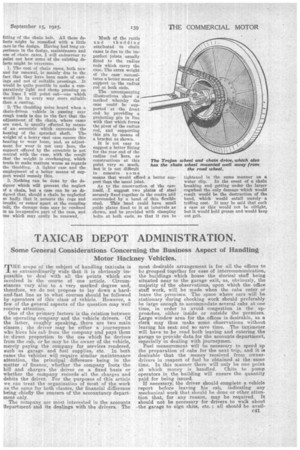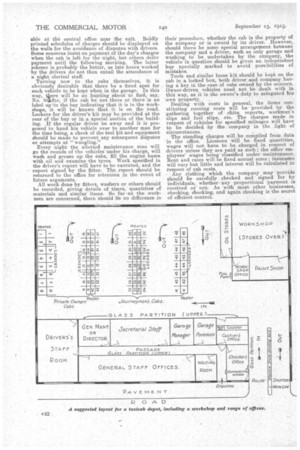TAXICAB DEPOT ADMINISTRATION.
Page 25

Page 26

If you've noticed an error in this article please click here to report it so we can fix it.
Some General Considerations Concerning the Business Aspect of Handling Motor Hackney Vehicles.
THE scope of the subject of handling taxicabs is so extraordinarily wide that it is obviously impossible to deal with all the points which are involved in the course of one article. Circumstances vary also to a very marked degree and, therefore, we do not propose to lay down a hardand-fast line as to what courses should be followed by operators of this class of vehicle. However, a few of the general aspects of the question may well receive attention.
One of the primary factors is the relation between the operating company and the vehicle drivers. Of the latter, roughly speaking, there are two main classes ; the driver may be either a journeyman who hires his cab from the company and pays them in direct proportion to the use which he derives from the cab, or he may be the owner of the vehicle, merelypaying the company for services rendered, such as garage and fuel supplies, etc. In both cases the vehicles will require similar maintenance attention, the principal differencebeing in the matter of finance, whether the company foots the bill and charges the driver on a fixed basis or whether the company records all the charges and debits the driver. For the purposes of this article we can treat the organization of most' of the 'work as the same for both classes, the financial difference being chiefly the concern of the accountancy department only.
The company are most interested in the accounts 'department and its dealings with the drivers. The most desirable arrangement is for all the offices to be grouped together for ease of intercommunication, the buildings which house the clerical staff being situated near to the garage exit, as, obviously, the majority of the observations, upon which the office staff work, will be made when the cabs enter or leave the premises. The space where cars will he stationary during checking work should preferably be large enough to accommodate several cabs at one time, in order to avoid congestion in the approaches, either inside or outside the premises. Large window area for the offices is desirable, as a clerk may thus make some observations without leaving his seat. and so save time. The taximeter will have to be read both leaving and entering the garage to provide data for the accounts department, especially in dealing with journeymen.
Fuel measurement will be necessary, to speed up the preparation of cabs for the next trip, and it is desirable that the money received from ownerdrivers in respect or fuel be obtained at the same time. In this manner there will only be one point at which money is handled. Chits to pump operators in the building will ensure the quantity paid for being issued.
If necessary, the driver should complete a vehicle report before leaving his cab, indicating any mechanical work that should be done or other attention that, for any reason, may be required. It should not be necessary for drivers to walk about ,the garage to sign chits, etc. ; all should be avail041
able at the central office near the exit. Boldly printed schedules of charges should be displayed on the walls for the avoidance of disputes with drivers. Some concerns insist on payment of the day's charges when the cab is left for the night, but others defer payment until the following morning. The latter scheme is probably the better, as late hours worked by the drivers do not then entail the attendance of a night clerical staff.
Turning now to the cabs themselves, it is obviously desirable that there be a fixed spot for each vehicle to be kept when in the garage. In this way, tlere will be no hunting about to find, say, No. 10Xfer, if the cab be not there or there is no label up in the bay indicating that it is in the workshops, it will he known that it is on the road. Lockers for the driver's kit may be provided at the rear of the bay or in a special section of the building. If the regular driver he away and it is proposed to hand his vehicle over to another man for the time being, a check of the tool kit and equipment slhould be made to prevent any subsequent disputes or attempts at "wangling!'
Every night the allotted maintenance man will go the rounds of the vehicles under his charge, will wash and grease up the cabs, fill the engine bases with oil and examine the tyres. Work specified in the driver's report will have to be executed, and the report signed by the fitter. The report should be returned to the office for retention in the event of future arguments. All work done by fitters, washers or others should be recorded, giving details of times, quantities of materials and similar items. Su far as the workmen are concerned, there should be no difference in their procedure, whether the cab is the property of the company or is owned by its driver. However, should there be some special arrangement between the company and a driver, such as only garage and washing to be undertaken by the company, the i vehicle n question should be given an independent bay specially marked to avoid possibilities of mistakes.
Tools and similar loose kit should be kept on the cab in a locked box, both driver and company having a key in the case of cabs owned by the concern. Owner-driven vehicles need not be dealt with in this way, as it is the owner's duty to safeguard his
own property. . Dealing with costs in general, the items constituting running costs will be provided by the gathering together of chits, reports, workmen's slips and fuel slips, etc. The charges made in respect of vehicles for specified mileages will have to be decided by the company in the light of circumstances.
The standing charges will be compiled from data • in the office. Licences will be fixed quantities, wages will not have to be charged in respect of drivers unless they are paid as such ; the other employees' wages being clasaified under maintenance. Rent and rates will be fixed annual stuns; insurance will vary but little and interest will be calculated in respect of cab costs.
• Any clothing which the companymay provide should Be carefully checked and signed for by individuals, whether, any proportional payment is received or not. As with most other businesses, checking, checking, and again checking is the secret of efficient control.






























